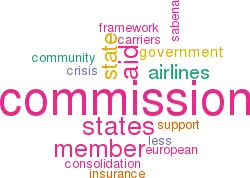European Commission under pressure
November 2001


Four weeks after the US terrorist attacks, the EC published its own response to the crisis. The Commission recognised that "certain emergency measures in support of the industry" could be adopted by the member states but emphatically warned against state aid not related to the events.
The framework covered the use of existing Community law on airport slots and state aid, insurance problems, security and compensation for the direct losses from the attacks. The Commission was very keen to prevent individual initiatives by member states that would distort competition between European airlines.
The Commission restricted state aid to compensation for actual damage sustained by EU airlines during the four–day closure of US airspace by limiting the calculation of losses on transatlantic routes, and thus excluded intra–European services from the equation.
Following the abrupt cancellation of war risk cover by the entire insurance industry (under the disguise of an up to 15 fold increase in premiums), the Commission allowed member states to provide insurance coverage to their carriers, initially for one month and to the end of the year if necessary.
The Commission also considered that the needed reinforcement of security measures must be borne by the member states.
In addition, the Commission promised to examine "on a case–by–case basis" requests for exemption from competition rules on agreements between companies and concerted practices. It would give favourable consideration to "capacity co–ordination agreements designed to maintain a regular service on less frequented routes or to coordinate schedule during off–peak periods of the day."
Most controversially, the Commission said that airlines were entitled to retain their slots with grandfather status in Community airports during the summer 2002 season. The Commission also pledged "the measure could be extended to the 2002/03 season if the current situation continued into the winter 2001 season."
At the same time, the Commission reminded Community airlines that it should not lose track of the need to "restructure and consolidate". The events of September 11 indeed stressed the need to move forward.
The response from Europe’s main carriers to the Commission framework has been less than enthusiastic. Although most of the original demands made in September by the AEA were met, the strict ban on individual state aid raised cries of outrage in many capitals.
Against this backdrop of firm opposition, only one member state, Belgium, has so far been allowed by the Commission permission to grant state aid to its national carrier Sabena. That this final gesture will not save Sabena — expected to go into bankruptcy during the first week of November — will not quench the appetite for aid in other states.
The convoluted reasoning of the Commission for allowing the Sabena case to go through became clear when it later turned down the Irish government request on behalf of Air Lingus: "A company has to be subject to a suspension of payments by a court to be eligible for a bridge loan."
Swissair indeed received a large contribution from the Swiss government in such circumstances but in any event, because the bilateral treaty between Switzerland and the EU has not been ratified yet, it is not clear whether the Commission can object to it.
Usually, it is the bane of the Commission that it is long on good intentions and short on political support from the member states. This has not been the case in the present aviation crisis. The member countries came out strongly in support of the Commission in mid–October. Already under pressure to meet the Community’s budget criteria in the current economic climate, the states are probably less than anxious to compete in dolling out aid to their national carriers.
Yet as the crisis deepens, the airlines inevitably have become more vocal in claiming that more must be done to help them. It was at first a minority of countries — France Italy and Ireland, not to forget Belgium — that called for government aid. The German government has been staunchly opposed to state aid to Lufthansa, as was the airline itself. That Germany maintains this policy is very important for the EC.
The call for consolidation by the Commission is a little disingenuous. The legal framework is simply not there. International ownership and control rules are a formidable obstacle to consolidation. member states too are not wholly innocent. By refusing a mandate to the Commission to represent all EU airlines vis-à-vis the rest of the world, particularly the US, European states make consolidation all the more difficult, if not impossible.